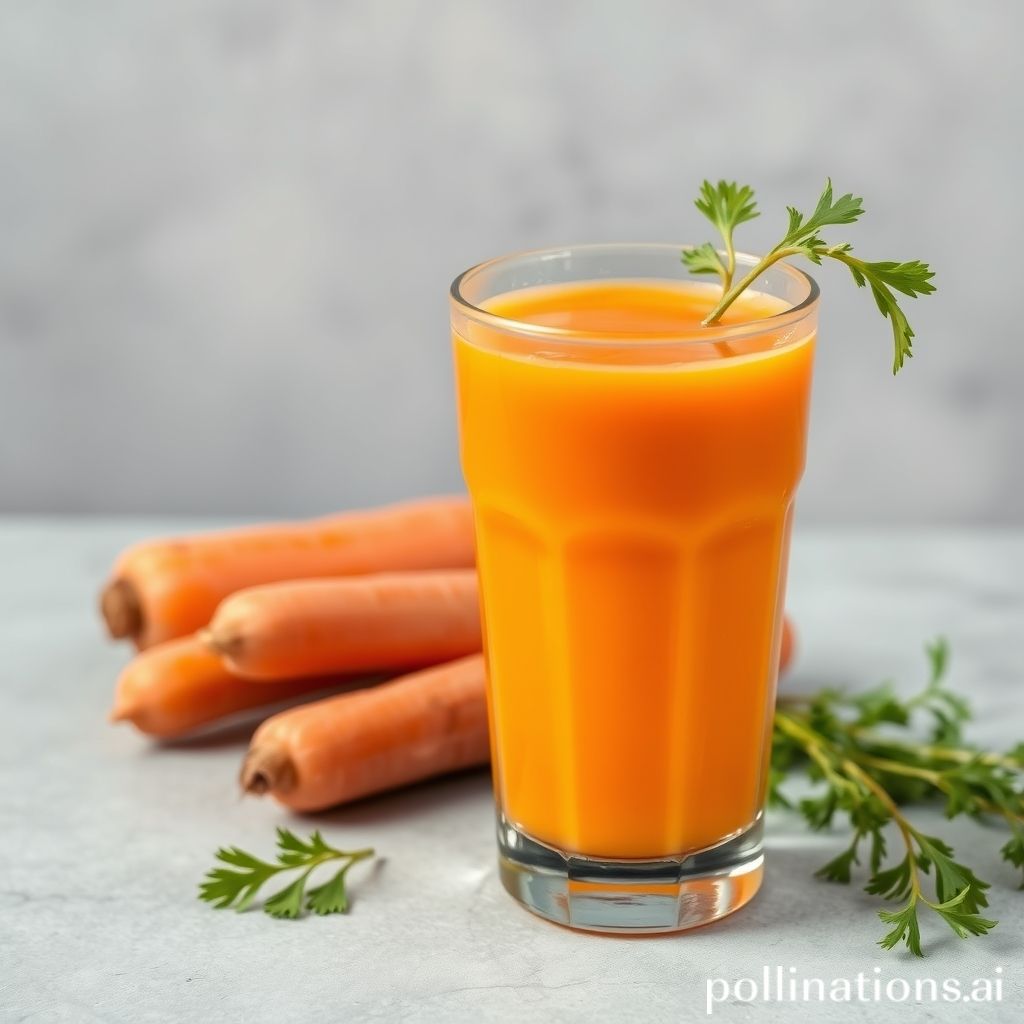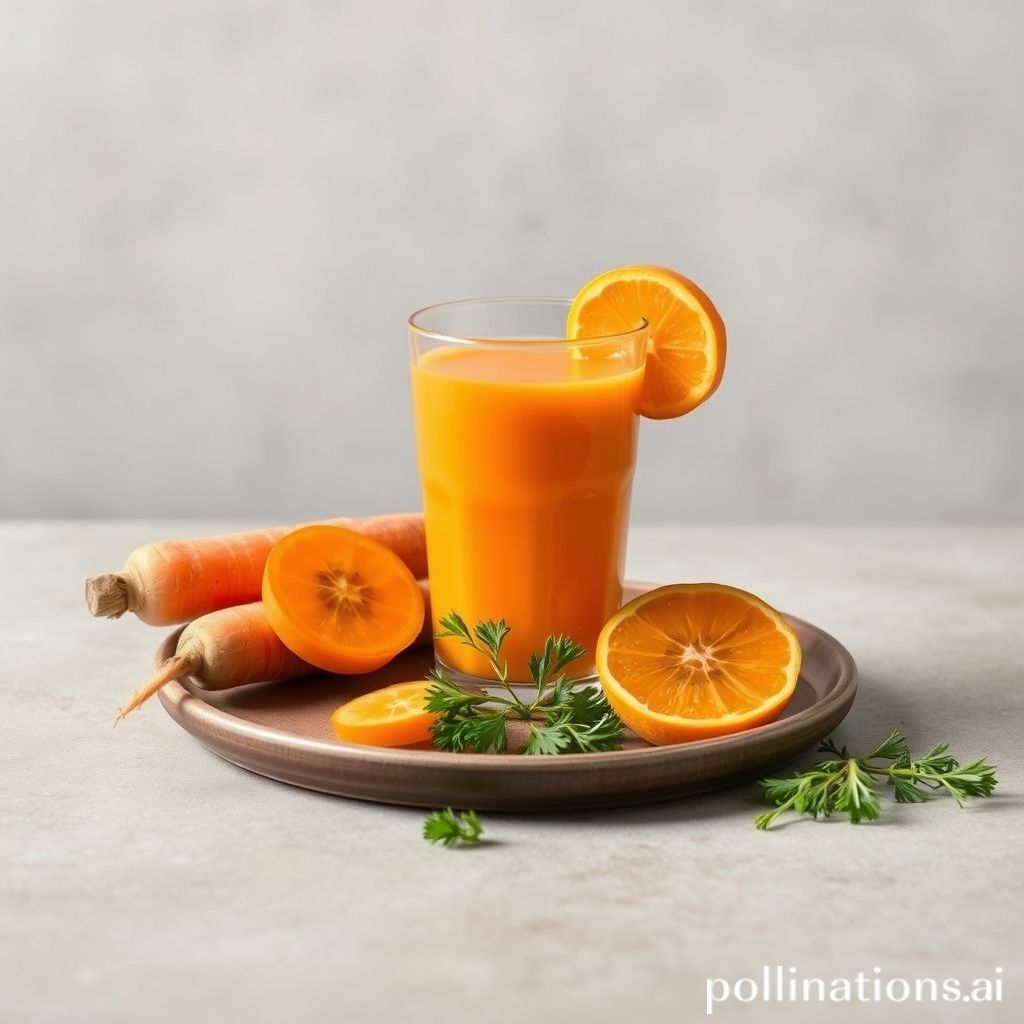Does Carrot Juice Lower Blood Pressure?
[su_note note_color=”#fb8e00″ text_color=”#000000″ radius=”12″]Carrot juice may help lower blood pressure.[/su_note]
Looking to improve your cardiovascular health in a natural and tasty way? Enter the world of carrot juice – a potential game-changer for lowering blood pressure. In this article, we delve into the nutritional benefits and latest research surrounding this vibrant elixir.
Discover how incorporating carrot juice into your daily routine could unlock a healthier you, as we explore its potential to take control of your blood pressure. So, grab a glass and get ready to sip your way to better cardiovascular health.

The Nutritional Composition of Carrot Juice
Key Nutrients in Carrot Juice
Carrot juice is packed with essential nutrients that contribute to overall health and well-being. These key nutrients include:
1. Potassium: Carrot juice is a rich source of potassium, an important mineral that plays a vital role in blood pressure regulation. Potassium helps relax blood vessel walls, promoting healthy blood flow and reducing the strain on the cardiovascular system.
2. Antioxidants: Carrot juice contains powerful antioxidants, such as beta-carotene, vitamin C, and lutein. These antioxidants help protect the body from oxidative stress caused by harmful free radicals. Oxidative stress can lead to inflammation and damage to blood vessels, potentially contributing to high blood pressure.
3. Nitrates: Carrot juice also contains nitrates, which are converted into nitric oxide in the body. Nitric oxide helps dilate blood vessels, improving blood flow and lowering blood pressure. Regular consumption of nitrate-rich foods, like carrot juice, has been associated with reduced blood pressure levels.
Role of Potassium in Blood Pressure Regulation
Potassium plays a crucial role in blood pressure regulation. It helps balance the effects of sodium, a mineral that can increase blood pressure. Potassium helps relax the walls of blood vessels, allowing them to widen and accommodate blood flow more efficiently. By promoting vasodilation, potassium helps lower blood pressure and reduce the risk of cardiovascular diseases.
Role of Antioxidants in Blood Pressure Management
The antioxidants found in carrot juice have been linked to blood pressure management. They help reduce inflammation, improve endothelial function, and protect against oxidative stress, all of which contribute to maintaining healthy blood pressure levels. Including carrot juice in your diet can provide a natural and delicious way to boost your antioxidant intake and support blood pressure health.
Role of Nitrates in Blood Pressure Reduction
Nitrates present in carrot juice are converted into nitric oxide, a compound that helps relax and widen blood vessels. This vasodilation effect improves blood flow and lowers blood pressure. Regular consumption of nitrate-rich foods, like carrot juice, has shown promising results in reducing blood pressure levels. Incorporating carrot juice into a balanced diet can be a beneficial strategy for individuals looking to manage their blood pressure naturally.
In summary, carrot juice is a nutrient-dense beverage that offers several potential benefits for blood pressure management. Its high potassium content, along with the presence of antioxidants and nitrates, contributes to its positive effects on blood pressure regulation. Including carrot juice as part of a healthy lifestyle may help support overall cardiovascular health and promote optimal blood pressure levels.
[su_highlight background=”#f6b40f”]Expert Tip: Boost your cardiovascular health with nutrient-rich carrot juice. Its potassium, antioxidants, and nitrates help regulate blood pressure.[/su_highlight]
Research on Carrot Juice and Blood Pressure
Summary of Relevant Studies on Carrot Juice and Blood Pressure
| Study 1: Effects of Carrot Juice on Blood Pressure |
|---|
|
| Study 2: Impact of Carrot Juice Consumption on Blood Pressure |
|
Discussion of the Findings and Limitations of the Studies
- Consistency or Inconsistency of Results: Both studies suggest a potential association between carrot juice consumption and blood pressure reduction. However, further research is needed to establish a consistent link.
- Factors Influencing Carrot Juice’s Effectiveness: Individual differences in metabolism, genetic predisposition, and overall dietary patterns may influence the effectiveness of carrot juice in lowering blood pressure levels.
- Need for Further Research: While the existing studies provide valuable insights, more extensive research, including long-term randomized controlled trials, is required to establish a conclusive and evidence-based link between carrot juice consumption and blood pressure reduction.
Incorporating Carrot Juice into a Balanced Diet
1. Importance of Including Carrot Juice in a Well-Rounded Diet for Blood Pressure Management
Carrot juice offers numerous benefits for individuals looking to manage their blood pressure levels. It is rich in antioxidants, vitamins, and minerals, making it a natural and effective way to support cardiovascular health. Here are some key reasons why incorporating carrot juice into a well-rounded diet is important:
- Antioxidant properties: Carrot juice contains powerful antioxidants like beta-carotene, which can help reduce oxidative stress and inflammation, ultimately contributing to lower blood pressure levels.
- Rich in potassium: High potassium intake is associated with lower blood pressure. Carrot juice is a good source of potassium, helping to maintain a healthy balance of electrolytes in the body.
- Dietary nitrates: Carrots are naturally high in nitrates, which are converted into nitric oxide in the body. Nitric oxide helps relax and dilate blood vessels, promoting better blood flow and potentially lowering blood pressure.
2. Ways to Incorporate Carrot Juice into Meals and Snacks
Incorporating carrot juice into your daily diet doesn’t have to be difficult. Here are some simple and creative ways to include carrot juice in your meals and snacks:
- Smoothies: Blend carrot juice with your favorite fruits like oranges, pineapples, or berries to create a refreshing and nutritious smoothie.
- Soups and stews: Use carrot juice as a base for soups and stews to enhance the flavor and add a nutritional boost.
- Sauces and dressings: Mix carrot juice with herbs, spices, and other ingredients to create delicious and healthy sauces and dressings for salads and main dishes.
3. Recipes and Meal Ideas Featuring Carrot Juice
Here are a few tantalizing recipes and meal ideas that incorporate carrot juice:
| Recipe | Description |
|---|---|
| Carrot-Ginger Soup | A comforting and flavorful soup made with pureed carrots, ginger, and vegetable broth. |
| Carrot-Orange Salad | A refreshing salad combining grated carrots, orange segments, and a tangy citrus dressing. |
| Carrot Juice Glazed Salmon | A succulent salmon fillet glazed with a sweet and tangy sauce made from carrot juice, honey, and soy sauce. |
Incorporating carrot juice into your diet can be both enjoyable and beneficial for managing blood pressure. Try out these ideas and recipes to discover new ways to include this vibrant and nutritious juice in your meals and snacks.

Complementary Lifestyle Factors for Blood Pressure Control
A. Regular Exercise for Blood Pressure Management
- Importance of incorporating physical activity into daily routine
- Types of exercises beneficial for blood pressure regulation
B. Stress Management Techniques for Better Blood Pressure Control
- Exploring relaxation techniques such as deep breathing and meditation
- Incorporating stress-reducing activities into daily life
C. Tips for Reducing Sodium Intake to Support Blood Pressure Regulation
- Understanding the impact of sodium on blood pressure
- Practical strategies for reducing sodium in meals and snacks
D. Importance of a Well-Rounded Diet for Overall Blood Pressure Management
- Emphasizing the need for a balanced and varied diet
- Incorporating other blood pressure-friendly foods alongside carrot juice
| Information |
|---|
| Regular exercise helps manage blood pressure levels. |
| Stress management techniques contribute to better blood pressure control. |
| Reducing sodium intake supports blood pressure regulation. |
| A well-rounded diet is important for overall blood pressure management. |
[su_note note_color=”#ea2e0c” text_color=”#ffffff” radius=”8″]Extra Tips: Exercise, stress management, reduced sodium intake, and a well-rounded diet are key for blood pressure control.[/su_note]
Precautions and Considerations
Consultation with a Healthcare Professional
Before adding carrot juice to your diet, consult with a healthcare professional. This is especially important if you have underlying health conditions or take medications. They can provide personalized guidance and ensure that carrot juice is suitable for you.
Potential Side Effects and Medication Interactions
Carrot juice is generally safe, but be aware of potential side effects and interactions with certain medications. Some people may have an allergic reaction to carrots, resulting in itching, swelling, or difficulty breathing. If you experience any adverse reactions after consuming carrot juice, stop using it and seek medical attention.
Carrot juice may also interact with certain medications, especially those broken down by the liver. The high vitamin K content in carrot juice can interfere with the effectiveness of blood-thinning medications like warfarin. Discuss any potential interactions with your healthcare provider if you are taking medication.
Guidance for Specific Health Concerns
For individuals with diabetes, monitor your carbohydrate intake, including the amount of carrot juice you consume. Carrots contain natural sugars that can affect blood sugar levels. Consult a registered dietitian or healthcare professional to determine the appropriate portion size and frequency of carrot juice consumption.
If you have kidney disease, be cautious with your potassium intake. Carrot juice is relatively high in potassium, and excessive consumption may be harmful to kidney health. Your healthcare provider can guide you on the appropriate amount of carrot juice to include in your diet.
Remember, while carrot juice can offer potential health benefits, consider your individual circumstances and consult with a healthcare professional to ensure its safe and appropriate incorporation into your diet.
Conclusion
Carrot juice has shown promise in lowering blood pressure, thanks to its rich nutritional profile containing potassium, antioxidants, and nitrates. While further research is needed to fully comprehend the effects of carrot juice on blood pressure, incorporating it into a well-balanced diet can be a valuable addition to managing blood pressure.
However, it is important for individuals with underlying health conditions or those on medications to consult with a healthcare professional before making significant dietary changes. By combining carrot juice with other lifestyle factors like regular exercise, stress management, and reduced sodium intake, individuals can enhance their efforts in maintaining healthy blood pressure levels.
[su_divider]
Faq about Carrot Juice and Blood Pressure
FAQ 1: Can carrot juice lower blood pressure on its own?
Carrot juice may have a positive impact on blood pressure due to its high potassium content. However, it is recommended to combine carrot juice with a balanced diet and a healthy lifestyle for better results.
FAQ 2: How much carrot juice should I consume for blood pressure management?
There is no specific recommended quantity of carrot juice for blood pressure management. Consuming one to two servings of carrot juice per day as part of a well-balanced diet can be beneficial.
FAQ 3: Are there any risks or side effects associated with drinking carrot juice?
Generally, drinking carrot juice is safe for most individuals. Excessive consumption of carrot juice may lead to a condition called carotenemia, where the skin turns yellowish-orange. Individuals with a history of kidney stones should consume carrot juice in moderation due to its high oxalate content.
FAQ 4: Can carrot juice interact with blood pressure medications?
Carrot juice is not known to interact with blood pressure medications. It is advisable to consult with a healthcare professional or pharmacist to ensure there are no potential interactions with specific medications.
FAQ 5: Can individuals with underlying health conditions consume carrot juice?
Individuals with underlying health conditions can generally consume carrot juice. It is important to consider individual dietary restrictions and consult with a healthcare professional if there are any concerns. Carrot juice is a good source of nutrients and can be a part of a healthy diet for individuals with various health conditions.
